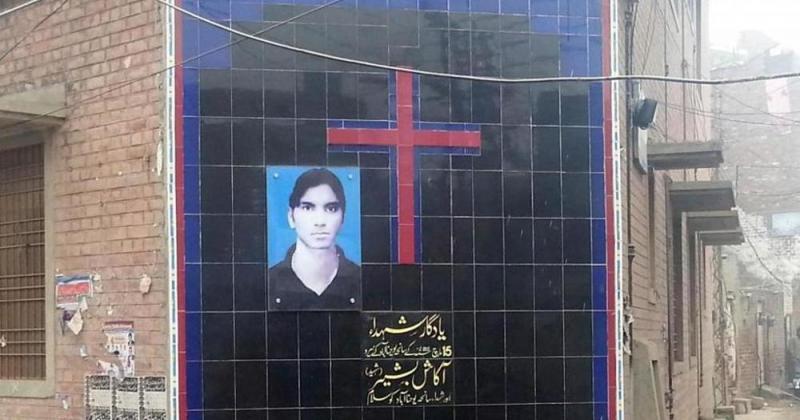During Lent and the celebrations of the Eucharist Year, Christians in the “Land of the Pure” remember their martyrs, as their endure their struggles with faith.
On the streets of Youhanabad, a Christian neighborhood in Lahore, in the southern part of Pakistan’s Punjab capital, children play on dirt roads amid busy small businesses. There seems to be no trace left of the fear or tension that three years ago besieged the local faithful, after the suicide bombings that simultaneously struck the two Christian churches in the neighborhood, one Catholic, the other Protestant.
But, at the corner of St. John’s Church, the portrait and monument to the young Catholic Akash Bashir, who was killed on 15 March 2015 as he tried to stop a suicide bomber, stands out on the dusty street. The Lent of Pakistani Christians also goes through the commemoration of those who are already considered martyrs. Francis Gulzar, parish priest of St. John’s Church and vicar general of the diocese of Lahore, asked to formally initiate the canonical process to proclaim the martyrdom of the young man, transmitting his story to the Vatican Congregation for the Causes of the Saints.
Alongside that of the young Akash, two stories of innocent Christians victims of murderous violence stand out: that of Shahabaz Bhatti, the Catholic minister for minorities who was killed by terrorist on 2 March 2011; and that of Shama and Shahzad Masih, the two spouses (she was Catholic, he was Protestant Christian) brutally tortured and burned alive in a brick furnace at Kot Radha Kishan on 4 November 2014.
But how has such a level of religious hatred and intolerance been achieved? For centuries, Christians have inhabited that part of the Indian subcontinent today known as Pakistan. And in the history of the country there are many renowned Pakistani Christians, such as Alvin Robert Cornelius, the first non-Muslim president of the Pakistani Supreme Court, but also politicians, educators, health and military workers. However today, Christians are among the poorest citizens, often employed in the most humble jobs, living in slums or small towns and villages called “colonies”. Youhanabad, in Lahore is one of them, but life is much worse if you move to the “Joseph Colony”, a sort of collective prison inhabited only by Christians, marked by degradation and subhuman living conditions. There live more than three thousand people, packed in precarious clay houses, without water, electricity, sewerage: a slum in the middle of the city, which supplies cheap labor to neighboring factories.
In 1947, when the British Empire ruled the partition, dividing the subcontinent in Pakistan and India and granting a homeland to the Muslims of South Asia, in an area marked by the rigid caste system, many Dalits (outcastes) who lived in the current Pakistan, especially after the second half of the 19th century, converted to the Christian faith. That caste stigma remains intact and is still felt in society today.
Moreover, the Republic of Pakistan, founded and conceived by founder Ali Jinnha as “a state for Muslims” but not as Islamic theocracy, has seen, throughout its history, a progressive process of Islamisation, with heavy interventions on the original Constitutional Charter. The most recent change in the constitution, which has severely penalized religious minorities as Christians and Hindus, was promoted by dictator Zia-ul Haq with Western support, by legitimizing Islamic militancy to fight the Soviet forces in Afghanistan.
It is a fact that, since the 1980s, life for the baptized in Pakistan has become more difficult and, after the US war in Afghanistan in 2001, attacks on Pakistani Christians have increased in number and ferocity.
The Pakistani bishops, however, are firm and have trust. No victimhood or signs of complaint. Faith is the element that allows us to look at “good” even in the most difficult times, “Our task is to give hope to our people. Hope comes from Christ who with his resurrection gave his disciples a message of peace and consolation” the Archbishop of Lahore, Sebastian Shaw explains to Vatican Insider. “As Pakistani Christians ,- Joseph Arshad, the new archbishop of Islamabad, adds - we must hold on to Christ in difficult times. Christ, The Good Shepherd, holds us in his arms, he consoles us and gives his life for us”.
It is with this spirit that the Catholic community in Pakistan lives the Year of the Eucharist. Ours is a life lived in full Eucharistic spirit, that is, of thanksgiving and blessing, up to the supreme gift of life itself”, Emmanuel Parvez, parish priest in the Faisalabad diocese, in Punjab, Pakistan, told Vatican Insider. “The key to living with peace and spiritual serenity in a sometimes violent and discriminatory social and cultural environment - the priest explains - is through forgiveness”, “it is the evangelical love of the enemy preached by Christ”.
A concrete response in this sense has recently come from the Protestant Christian faithful community of the “Church of the Assemblies of God” in the Karachi area, in the South of the country. After having been attacked by some Muslims after the Sunday liturgy on 11 February last, the local faithful forgave the oppressors and at the police station, signed an official declaration which closed the matter.
“As Christians, we are called to forgive those who hurt us,” Pastor Samson Ashiq said, “This is what Lent calls for. We want to promote reconciliation and harmony”.
